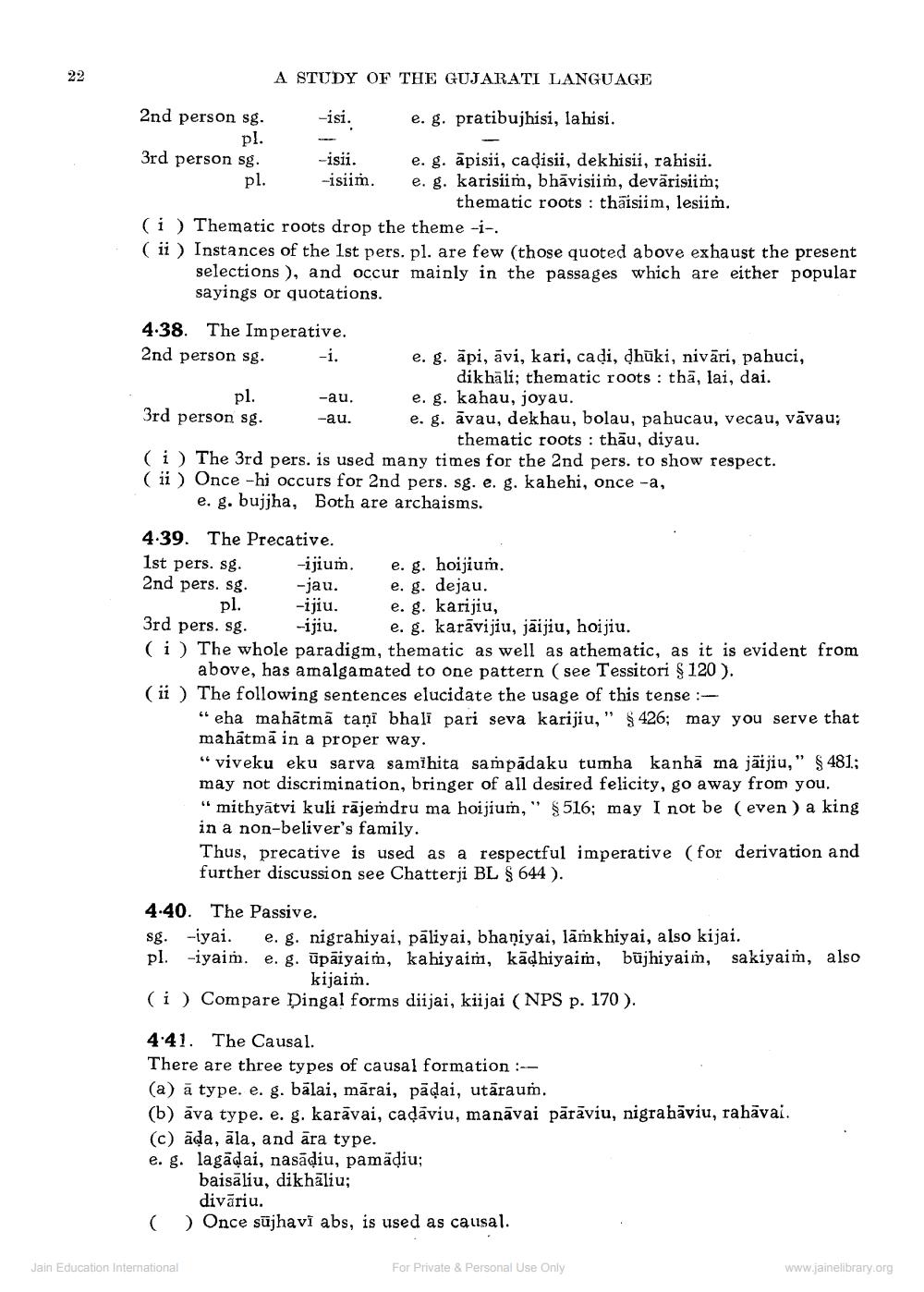________________
22
A STUDY OF THE GUJARATI LANGUAGE
pl.
2nd person sg. -isi. e. g. pratibujhisi, la hisi.
pl. 3rd person sg. -isii. e. g. āpisii, cadisii, dekhisii, rahisii.
-isiim. e. g. karisiim, bhāvisiim, devārisiim;
thematic roots : thaisiim, lesiim. (i) Thematic roots drop the theme -i-. ( ii ) Instances of the 1st pers. pl. are few (those quoted above exhaust the present
selections ), and occur mainly in the passages which are either popular sayings or quotations.
4.38. The Imperative. 2nd person sg. -i. e. g. āpi, āvi, kari, cadi, dhuki, niväri, pahuci,
dikhāli; thematic roots : tha, lai, dai. pl.
-au. e. g. kahau, joyau. 3rd person sg. -au. e. g. āvau, dekhau, bolau, pahucau, vecau, vāvau;
thematic roots : thāu, diyau. (i) The 3rd pers. is used many times for the 2nd pers. to show respect. (ii) Once -hi occurs for 2nd pers. sg. e. g. kahehi, once-a,
e. g. bujjha, both are archaisms.
4.39. The Precative. 1st pers. sg. -ijium. e. g. hoijium. 2nd pers. sg. -jau. e. g. dejau.
pl. -ijiu. e. g. karijiu, 3rd pers. sg. -ijiu. e. g. karāvijiu, jāijiu, hoijiu. (i) The whole paradigm, thematic as well as athematic, as it is evident from
above, has amalgamated to one pattern (see Tessitori S 120). (ii) The following sentences elucidate the usage of this tense :
"eha mahātmā taņi bhali pari seva karijiu," S 426; may you serve that mahātmā in a proper way. "viveku eku sarva samihita sampadaku tumha kanha ma jāijiu," $ 481; may not discrimination, bringer of all desired felicity, go away from you. "mithyātvi kuli rājendru ma hoijium," $516; may I not be (even ) a king in a non-beliver's family. Thus, precative is used as a respectful imperative (for derivation and further discussion see Chatterji BL S 644 ).
4.40. The Passive. sg. -iyai. e. g. nigrahiyai, paliyai, bhaniyai, lāmkhiyai, also kijai. pl. -iyaim. e. g. ūpäiyaim, kahiyaim, kādhiyaim, būjhiyaim, sakiyaim, also
kijaim. (i ) Compare Dingal forms diijai, kiijai (NPS p. 170 ).
4:41. The Causal. There are three types of causal formation :-- (a) a type. e. g. bālai, mārai, pādai, utāraum. (b) ava type. e. g. karāvai, cadàviu, manāvai pārāviu, nigrahāviu, rahävai. (c) ada, āla, and ara type. e. g. lagādai, nasādiu, pamädiu;
baisāliu, dikhāliu;
divāriu. C ) Once süjhavi abs, is used as causal.
Jain Education International
For Private & Personal Use Only
www.jainelibrary.org




